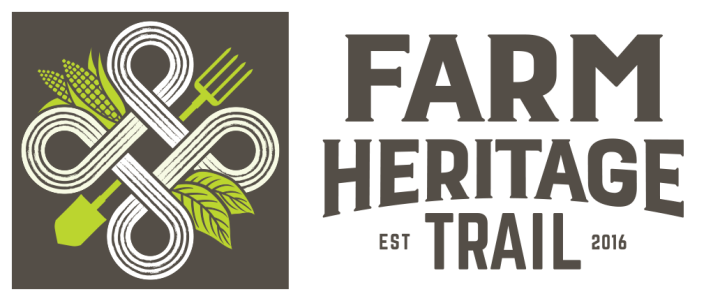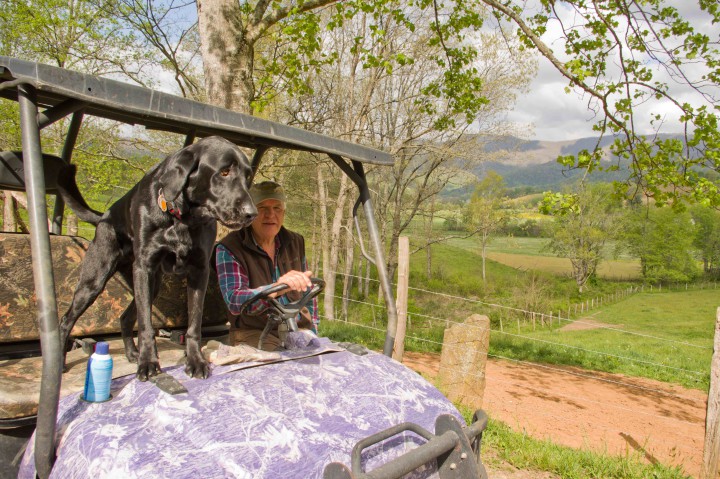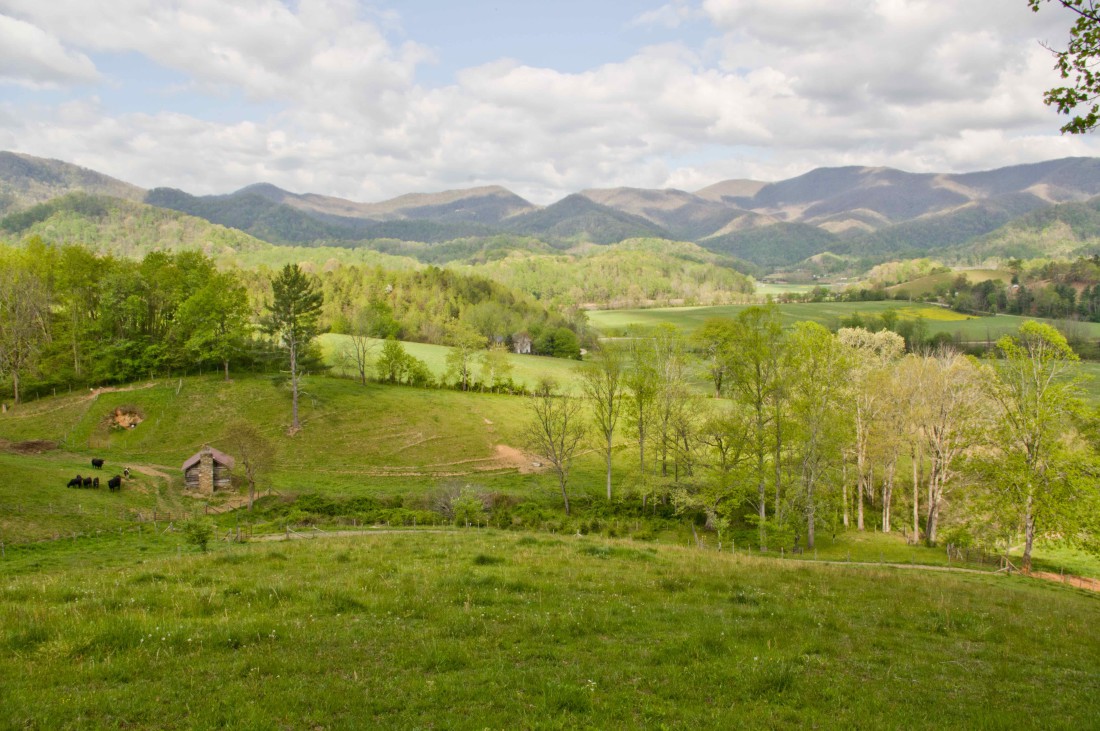Out-of-towners who flock to Asheville for mountain views, world-class dining and a taste of Appalachian culture probably don’t often make a point of including a drive to northwest Buncombe County on their travel itineraries. Sparsely populated rural communities like Sandy Mush, Leicester, Newfound and Alexander tend to be pretty far off the radar for tourists — and even for many locals. But the Farm Heritage Trail, a recent collaborative effort from the Buncombe County Soil and Water Conservation District’s Farmland Preservation Program and a handful of passionate farmers, shines a spotlight on this quiet agricultural area just outside of Asheville.
Open since April (but with an official kickoff celebration planned for Saturday, May 7), the trail is a driving and cycling route focused on preserving local heritage and boosting agritourism to support small farmers. The trail follows winding public roads, offering a mountain-studded tour of nearly a dozen centuries-old family farms.
The entire route takes about two hours to drive. Six designated stops allow guests to tour small agricultural operations, interact directly with the farmers and support them by shopping for such diverse products as fresh produce, eggs, bison meat, herb starts, wine and Christmas trees. Participating farms will offer regularly planned events such as educational hikes, demonstrations and hands-on workshops (visit farmheritagetrail.org for a schedule).
Saving for the future
“This is one of the few rural farming areas left in Buncombe County,” says trail organizer Terri Wells. “This [community] even has a dirt road, and there aren’t many of those left,” she adds, peering through the windshield of her SUV as it traverses a dusty shortcut that connects points on the trail somewhere between Alexander and Leicester.
Wells comes by her enthusiasm for farms — and dirt roads — honestly. A former educator and employee of the Asheville City Schools Foundation, she returned to her roots several years ago, taking over operation of the 200-year-old family farm (on a dirt road) where she grew up in Sandy Mush. That area still boasts the most overall farm acreage in Buncombe County, according to the BCSWCD. As the ninth generation of her family to work the land at Bee Branch Farm, she earns income from selling honey from her beehives and marketing her fruits and vegetables through a community supported agriculture program.
Wells says the idea for the Farm Heritage Trail evolved from conversations with the communities’ farmers. In September 2015, a $6,000 grant from Buncombe County Parks and Recreation made the initiative possible. “The timing was finally good to launch the project because of the support from the community and organizations who value our farms, healthy food and the many benefits that our local farms provide,” she explains.
Aside from just having a love of farming, Wells and the other landowners on the Farm Heritage Trail are invested in preserving their farms for future generations. In 2009, Wells’ family conserved over 500 acres of their land with the Southern Appalachian Highlands Conservancy. Although the farm is still privately owned by her family, it is now permanently preserved as an agricultural conservation easement. This means it can no longer be developed, regardless of who may have possession of it in the future — something of vital importance considering the amount of farmland in Buncombe County dwindled from more than 103,870 acres in 1987 to less than 71,500 acres in 2012 (county-level agricultural land data is only published every five years), according to statistics from the U.S. Department of Agriculture.
All 11 farms currently featured on the trail share Wells’ interest in conserving their land. “So far, we are only working with farmers who have made some kind of commitment to farmland preservation,” says Wells, explaining this typically means the farms have obtained agricultural easements either through the county or SAHC. While the trail’s multipronged mission has recreational, historical and educational components, “part of what it’s about is the reality that we need to have farmland,” she says. “If we don’t take care of it, we won’t have the ability to grow all the local foods that we want to have here. And visitors, they’re drawn here for the food culture, they come here for that.”
Respect for the land
Wells keeps driving along the trail, pointing out such conserved properties as Carolina Bison, Gaining Ground Farm and the SAHC’s Community Farm, where the organization hosts its Beginning Farmer Incubator Program. Each farm on the trail is identified by green-and-gray signage featuring the Farm Heritage Trail’s logo.
She crosses New Leicester Highway, noting that people following the trail can stop there to refuel at a gas station or grab a meal at the Turkey Creek Cafe. Eventually, the small, white-painted Big Sandy United Methodist Church looms on a hill, marking the entrance to Big Sandy Mush. Just past the church, Wells turns left down a long drive and stops at Dave and Kim Everett’s historic Sandy Mush Farm.

Stepping out of the vehicle, the only sounds are birdsong and wind chimes in the breeze. The view from the farm on this early spring day is almost unbelievably beautiful. The sky seems impossibly huge, and the wide, green valley stretches into gentle slopes that erupt into blue peaks lightly dusted with snow and laced with clouds. Only a sprinkling of houses and barns dot the panorama. It is hard to imagine such an old-fashioned, pastoral landscape existing in 2016 — and just a few short miles from the bustle of Asheville.
Compared to Wells, the Everetts are newcomers to the area. Having moved to Buncombe County in the early 2000s, they purchased their farm from the McCracken family, who had owned it for generations. By 2009, they had completed the process of obtaining a conservation easement through BCSWCD. The goal, says Dave Everett, was to demonstrate “the viability of taking on the project of an old farm sliding downhill and rehabbing it.” Despite the reality that running a small farm these days is “barely a break-even proposition,” Everett says he is still deeply committed to preserving his land for the generations to come.
“This farm really goes back to an abiding respect for the land, a belief in the future of the land, a belief in the responsibility we have to the land,” he says, standing outside his immaculately restored home and glancing at the surrounding mountains and his Angus cattle grazing in the fields. “It’s a real treasure — for Buncombe County, for the city of Asheville, for the state of North Carolina. It’s baffling to me when I think about the, I suppose, millions of dollars that tourism brings to Buncombe County, and the realization that people come here because it doesn’t look like anywhere else. Yet we spend so much of our energy in the name of progress to make it look exactly like everywhere else. If we’re successful in ruining these vistas, it will be a truly sad turn of events.”
While Sandy Mush Farm isn’t a regular farm stop, the Everetts will welcome guests to their property for a guided history hike during the trail’s kickoff celebration.
Back to nature
Fairman and Kate Jayne of Sandy Mush Herb Nursery joined the community a bit earlier than the Everetts. In the 1970s, they started their mail-order plant business on 400 acres of land, also purchased from the McCracken family, that had been a collection of small farms since the 1800s.
The Jayne’s homestead is perched high on a mountain at the end of a narrow, bone-shaking dirt road. They welcome visitors for tours — and seeing their operation is well worth the adventure of getting there. Over the decades, they have carefully built a collection of rustic greenhouses filled with plants of every imaginable kind, as well as prolific herb and perennial gardens and a handcrafted home and outbuildings. In the glowing green of the forest, the place resembles something out of a fairy tale.
“We had always wanted to have a place of our own, with water rising on the place and clean air. Good open land for our kids to grow up in,” says Kate Jayne. They raised their two children, Christopher and Nicketie, in that magical spot, and their hope is that the Farm Heritage Trail will allow them to draw more visitors, providing a means to share their land and knowledge with others.

“Many people have no clue where their herbs come from, where their eggs come from,” says Kate Jayne. “There’s a big move right now to get people connected back to nature.”
Along with tours (including a guided hike through their gardens and forests on Saturday, May 21), the Jaynes plan to offer workshops on various topics, such as wood selection and woodworking using trees from their forest and creating items at a sawmill on their property. “There are so many interesting woods up here,” Kate Jayne muses. “So many grains, colors and textures. Even just showing people wood samples would be informative.”
A worthy endeavor
Heading back onto New Leicester Highway, Wells makes a final stop at Dave Snelson‘s Sycamore Valley Farm Store, where a step inside the softly creaking screen door finds Snelson sitting behind the counter. Part of his business is raising and selling lamb — he jokes that he sold some that morning that was so fresh it was still walking around on four legs. At his little roadside store, he also offers seasonal fresh produce from his 150-acre family farm seven days a week.
Snelson, who says he’s been a member of the Buncombe County Farm Bureau for “a lot of years,” also stocks an assortment of eggs, meat and vegetables from other local farms. “We know the ones who are growing it, and that gives us knowledge of how it’s grown,” he says, explaining his commitment to supporting other small farmers and sustainable farming practices.
“Dave is a farmer who understands the need to transition with the times,” says Wells. “From the dairy farm of our youth to the opening of his farm store and his local lamb market.”
Behind the store sits the house Snelson’s great-grandfather built in 1885. Wells remembers playing there with Snelson’s daughter when she was a girl. To preserve the rich, flat farmland that stretches as far as the eye can see, as well as his family’s heritage, he made his entire farm a conservation easement in 2011. Snelson hopes that by working with the Farm Heritage Trail, he can help younger generations learn about agriculture and the value of farmland. On Saturday, May 14, Snelson will host an all-day Farm Heritage Trail event featuring demonstrations by the North Carolina Apiary Inspection Program, a 3-D farm combine simulator and farm-focused children’s educational activities.
“The kids can plant a squash or a cucumber seed in a cup and take it home,” he says of the event. “Some people, even the parents, have never planted a seed before, don’t know how it grows.”
In the end, despite the broad diversity of the trail’s farms and farmers, they all seem to be united in their hope that the Farm Heritage Trail initiative will allow northwest Buncombe County’s historic communities to maintain their agrarian ways — and gorgeous vistas — well into the future.
“We’re just the temporary custodians, the stewards,” says Dave Everett. “We see the relentless development, the unending urban sprawl that is a threat to these viewscapes, and we want to do our part in slowing down some of that, in my words, insanity. So this land is conserved into perpetuity … and that represents a chance to do something larger than ourselves as individuals. And that seems like a pretty worthy endeavor.”



LOVE Sandy Mush! Great people doing great things!